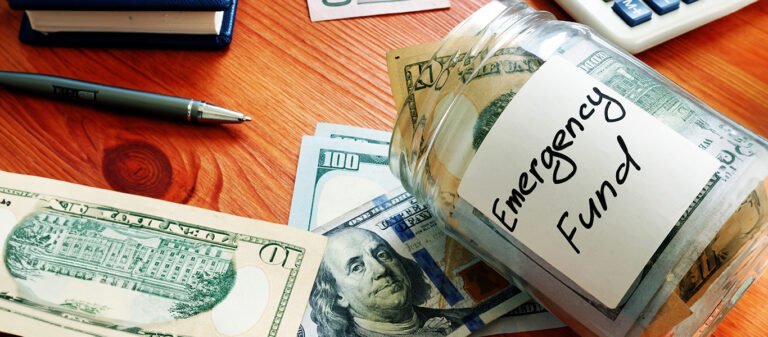How do I prepare for unexpected situations?
Please rotate your device for the best experience.
Transcript
Savings 9-1-1
Interactive Video
[A woman with a frustrated look on her face, sitting at a table, holding her face with her hands as she looks down at a piece of paper. A man is standing behind her talking on the phone with an angry expression on his face.]
Narrator: What percentage of people in the United States do you think don’t have enough savings to handle a $400 emergency? Select an option.
Option 1: under 20%
Option 2: between 20-30%
Option 3: between 30-40%
Option 4: over 50%.
[Pie chart with 37% highlighted.]
Narrator: According to the Federal Reserve System’s 2021 report, over 33% of the population would not be able to deal with a $400 emergency because of lack of money in their savings account. That’s almost 4 out of every 10 people!
[A pile of money at the top of the screen slowly filters toward each of the 5 icons below: a car repair, a plumbing leak, an unpaid bill, no job, and a medical issue.]
Narrator: Everyone faces unwanted surprises like a car repair, plumbing issue, or unexpected bill. It can really throw off your monthly finances if you don't have money on hand. A bigger issue, like losing your job or a medical emergency, can require even more money to get you through the situation.
[A woman covering her face with one hand and holding two credit cards with the other hand.]
Narrator: And, if you have to borrow money when something unexpected happens, it actually ends up costing you more than the emergency itself because of interest charges.
[Smiling male teenager looking at his smartphone holding a credit card.]
Narrator: It's less stressful if you can be proactive and make sure you're ready for anything that might come your way.
[An arrow moving toward a box labeled “money crisis”. The arrow moves up and over the box, missing it. The box’s label changes to “savings”. Money then falls into the box.]
Narrator: So, how do you avoid a money crisis? It sounds simple: save! But obviously saving isn’t that simple, or everyone would be doing it.
[Kerry smiling.]
Narrator:Take a look at Kerry’s financial situation.
Financial Breakdown [Information fills in as narrator speaks]:
Friday; Income: $950; Balance: $950
Tuesday; Groceries: $207.45, Balance: $742.55
Wednesday: Car Payment: $575.25, Balance: $167.30
Thursday: Summer Camp
Thursday: Vet?
Narrator: He got paid last Friday. His car payment will be auto-paid from his account on Wednesday. He hasn’t made a grocery run in almost two weeks so he definitely needs to get food.
[Kerry’s face changes to a shocked expression]
Narrator: Wow! The cost of food has gone through the roof recently!
[Kerry’s face changes to a thinking expression.]
Hmmm, let’s see. Car payment comes out today.
[Kerry’s face changes again with his hands covering his mouth and a bewildered look on his face.]
Narrator: Shoot! Summer camp payment is due tomorrow for his son - that slipped Kerry’s mind. Oh, and the dog has been limping for 3 days - he should really see the vet!
Narrator: Now what? Pay for summer camp or take the dog to the vet? How would you advise Kerry on what he should do?
Option 1: Pay for summer camp
Option 2: Take the dog to the vet
Option 1 Results:
Kerry: Wow! I am not sure what I’m going to live on till next pay day.
[Summer camp: $125.00, Balance: $42.30.
Vet ?]
Option 2 Results:
Kerry: Great! The dog tore his ACL and needs surgery. There goes my credit card balance. I’m not sure if I should pay for summer camp or wait. I don’t have much left until next pay day.
[Summer camp: $125.00, Balance: $42.30.
Vet? followed by an image of a credit card.]
Narrator: Kerry doesn’t have any easy choices. If he had been saving money, he might be able to deal with these unexpected expenses better.
[Kerry’s thought bubble: “I wish I had been saving money.”]
[Collage of a car wreck, a plumbing leak, an ambulance, and a computer malfunction. The text “prioritize saving” appears.]
Narrator: The key is to prioritize saving to avoid these kinds of situations. Savings can act as a safety net, so you're prepared for unexpected expenses.
